Iqbal | Quran and Hadith
Quran and Hadith are the foundation of all teachings in Islam. Poet of the East Dr. Mohammad Iqbal advises the Muslim Ummah to read the Holy Quran and derive guidance from it. He says in his famous and well-known speech “A Muslim Sufi says that until the revelation of the Book (Quran) to the inward of a believer is not the same as it was to the Holy Prophet, it is impossible to understand it.” (Iqbal aur Quran, page 9)
Iqbal highlights this topic in his poetry as well:
ترے ضمیر پہ جب تک نہ ہو نزولِ کتاب
گِرہ کشا ہے نہ رازی، نہ صاحب ِ کشاف
Explanation: Unless the Quran reveals directly upon your inward, no scholar or exegesis can explain its exact meaning. (Bal-e-Jibril/Gabriel’s Wing)
Dr Muhammad Abdul Muqeet Shakir Aleemi writes in his book “Iqbal aur Hadees”:
- Allama Iqbal’s poetry is a reflection of Quran and Hadith. No doubt, the yearning for work that developed in Allama Iqbal due to his love for the Holy Prophet encompassed all aspects of his life. Everything Allama Iqbal gathered from the Holy Prophet’s life, he explained as it is in his philosophical style. This is Allama Iqbal’s grandeur. (Iqbal aur Hadees, page 22)
Iqbal says:
مجھے رازِ دو عالم دل کا آئینہ دکھاتا ہے
وہی کہتا ہوں جو کچھ سامنے آنکھوں کے آتا ہے
Explanation: I see the secrets of both the worlds in the mirror of my inward. I only utter what I see in it. (Bang-e-Dara/The Call of the Marching Bells)
Allama Iqbal was a Saint and teachings of Saints are indeed teachings of Quran and Hadith. Allama Iqbal’s poetry is being explained in the light of teachings of Quran and Hadith for the readers to prove them that his teachings and message are only conveying the Quran and Hadith.
Faqr and Iqbal
- The Holy Prophet says about Faqr:
- اَلْفَقْرُ فَخْرِیْ وَالْفَقْرُ مِنِّیْ
- Meaning: Faqr is my pride and Faqr is from me.
- اَلْفَقْرُ کَنْزٌ مِنْ کُنُوْزِ اللّٰہِ تَعَالٰی
- Translation: Faqr is one of the treasures of Allah.
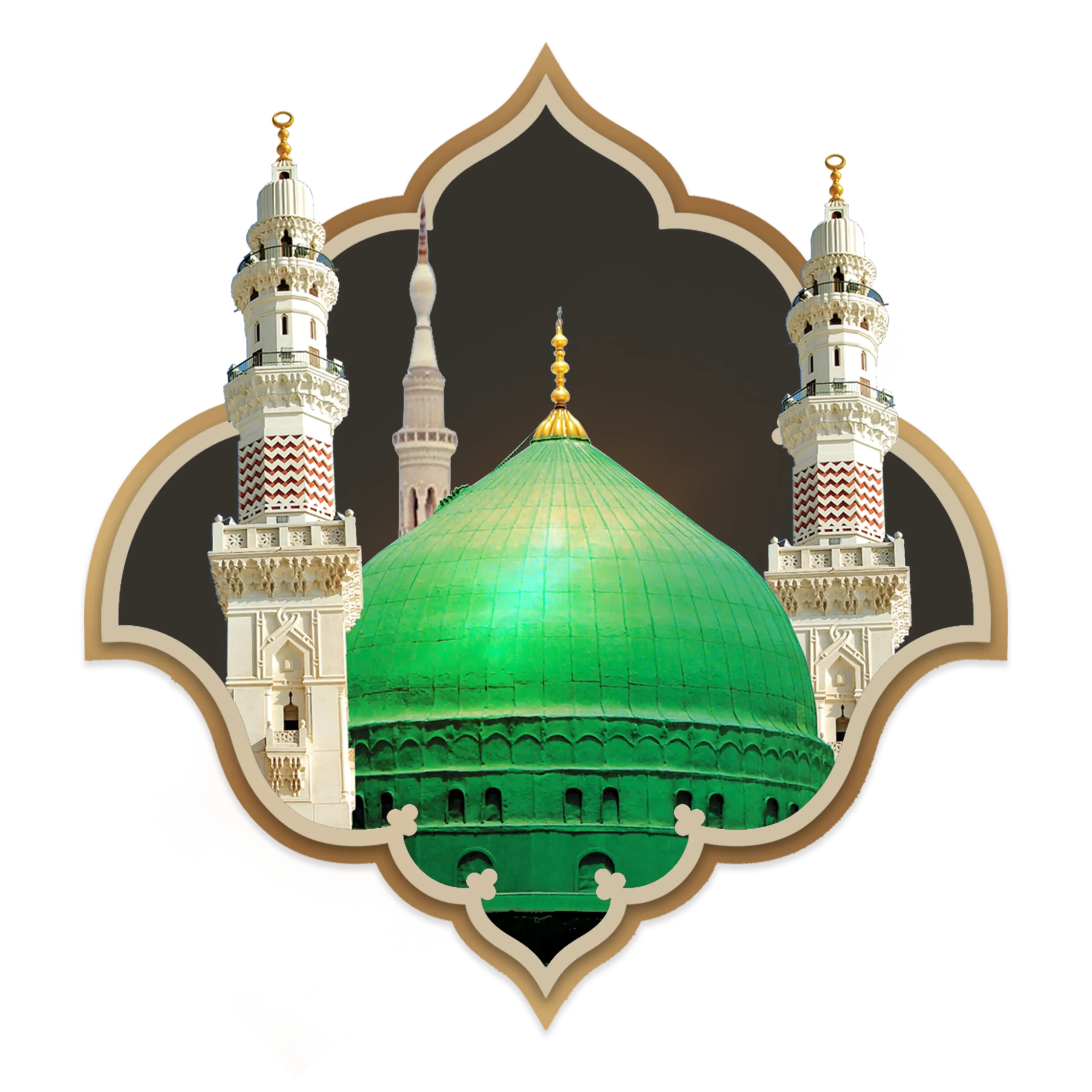
اَلْفَقْرُ فَخْرِیْ وَالْفَقْرُ مِنِّیْ فَافْتَخِرُّ عَلٰی سَآئِرِ الْاَنْبِیَآئِ وَالْمُرْسَلِیْن
Meaning: Faqr is my pride and Faqr is from me and Faqr is the reason of my superiority over all the Prophets and Messengers.
Allama Iqbal said about Faqr:
کسے خبر کہ ہزاروں مقام رکھتا ہے
خودی کو جب نظر آتی ہے قاہری اپنی
خودی کو جب نظر آتی ہے قاہری اپنی
یہی مقام ہے کہتے ہیں جس کو ’سلطانی‘
یہی مقام ہے مومن کی قُوَ تُوں کا عیار
اسی مقام سے آدم ہے ’ظِلِّ سبحانی‘
Explanation: A very few know that Faqr holds innumerable stations and at its exaltation, the soul of the Holy Quran is unveiled. The position when a devotee receives the prestigious title of Sultan is when his soul reaches the pinnacle of its potential. Sultan is the last station which is the zenith and touchstone of the strengths of true believers. At such a level, a person transforms into the real embodiment of Allah’s Essence. (Zarb-e-Kalim/The Rod of Moses)
Two kinds of Faqr
There are two kinds of Faqr. First is the chosen Faqr and the other is the compulsive Faqr. Both are very different from one another. The chosen Faqr is the one that the Holy Prophet took pride in. On the other hand, the compulsive one is that brings disgrace. The Holy Prophet said:
- نَعُوْذُ بِاللّٰہِ مِنْ فَقْر الْمُکِبْ
Meaning: I seek refuge in Allah from Faqr that brings disgrace.
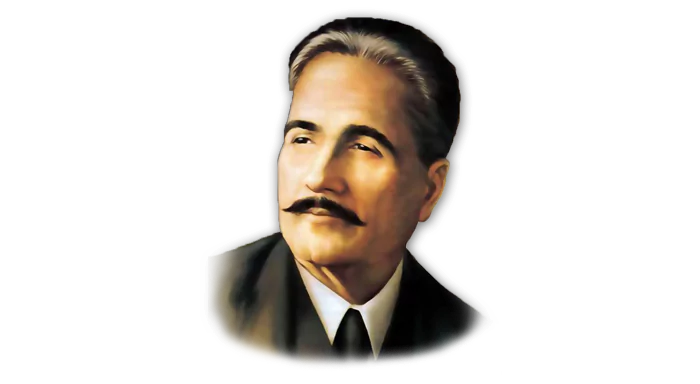
Allama Iqbal says about this kind of Faqr:
اک فقر سے قوموں میں مسکینی و دلگیری
اک فقر سے مٹی میں خاصیتِ اکسیری
Explanation: Beware of that Faqr (compulsive) which only brings you downfall and misery! Whereas the true Faqr gives the power to transform dust into gold by alchemy. (Bal-e-Jibril/Gabriel’s Wing)
Iqbal and Love for the Prophet (PBUH)
Allah revealed the Quran for the welfare and reformation of mankind. He made its practical form live among us forever in the form of the Holy Prophet. One cannot reach the reality of Islam without recognizing the Holy Prophet and reaching his noble presence.
Allama Iqbal says:
بمصطفٰیؐ برساں خویش را کہ دین ہمہ اوست
اگر بہ او نرسیدی، تمام بولہبی است
Explanation: You must take yourself to Prophet Mohammad (that is the Mohammadan Assembly) as he is the complete and perfect faith. If you do not take yourself to Prophet Mohammad, your whole faith is like that of Abu Lahab. (Armaghan-e-Hijaz/The Gift of the Hijaz)
Love and devotion to the Holy Prophet is the foundation of faith.
The Holy Prophet says:
- Anas ibn Malik relates:
The Holy Prophet said "None of you will have faith till he loves me more than his father, his children and all mankind." (Sahih Bukhari 15)
Allama Iqbal mentions love for the Holy Prophet again and again in his poetry.
He says:
کی محمد سے وفا تو نے تو ہم تیرے ہیں
یہ جہاں چیز ہے کیا لوح و قلم تیرے ہیں
Explanation: If you are loyal to the Holy Prophet, then I am yours. (Bang-e-Dara/The Call of the Mrching Bells)
Intoxication of Divine Love
Allama Iqbal says that the believer is one who considers following the Holy Prophet’s Sunnah a beacon. So he considers this belief to be true faith and the zenith of humanity. In fact, all states of intoxication of Divine love are replete with Mohammadan light.
Allama Iqbal says in “Musafir”:
می ندانی عشق و مستی از کجاست
این شعاعِ آفتابِ مصطفٰیؐ است
زندیٴ تا سوزِ او در جانِ تست
این نگہ دارندہٴ ایمان تست
Explanation: Do you not know where love and its intoxication comes from? It is a ray from the Sun that is the Holy Prophet (from it believers’ inwards enlighten). As long as its flame is in your soul, you are alive, this heat is the guardian of your faith.
Iqbal and Kalima Tayyab

Allama Iqbal also gives the same message to the Muslims in his poetry that the soul and true evolution of man is based on the condition that he acknowledges the Oneness of Allah with tongue and inward. He should associate the kalima tayyab or the Muslim creed (There is none worthy of worship except Allah and Muhammad (PBUH) is the messenger of Allah) with himself in such a way that his actions prove that he neither fears nor obeys anyone other than Allah, does not declare anyone else to be worthy of worship, love or desire.
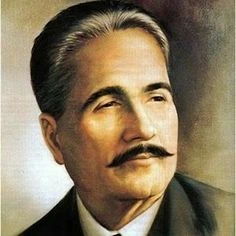
Allama Iqbal says:
تا نہ رمز لَااِلٰہَ آید بدست
بند غیر اللہ نتوان شکست
Explanation: One cannot break the bonds of everything other than Allah until the meaning of Kalima is understood and achieved. (Pas Che Bayad Kard)

Allama Iqbal says:
پیش غیر اللہ "لا" گفتن حیات
تازہ از ہنگامہٴ او کاینات
Explanation: Neglecting everything other than Allah is life. It freshens the world. (Pas Che Bayad Kard)

The Holy Prophet says:
There are many people who read Kalima Tayyab formally and customarily, but those who recite Kalma Tayyab sincerely are very few.
Allama Iqbal says:
خرد نے کہہ بھی دیا ’لَا اِلٰہَ‘ تو کیا حاصل
دل و نگاہ مسلماں نہیں تو کچھ بھی نہیں
Explanation: What really matters is inward verification. Merely reciting verbally, “There is no God but Allah,” has no impact on the soul. You become a Muslim by this utterance but cannot be a true believer. Indeed, if your inward and soul are not Muslim you cannot achieve anything. Thus, the spiritual endorsement that nothing exists except Allah makes one a believer. (Zarb-e-Kalim/The Rod of Moses)
“Disbelief” According to Allama Iqbal
Shirk or polytheism is the biggest sin. Allah should be the only beacon of hope. A hadith goes:
The Holy Prophet said: Let one of you ask his Lord for his needs, all of them, even for a shoestring when it breaks.
Allama Iqbal says:
بتوں سے تجھ کو امیدیں، خدا سے نومیدی
مجھے بتا تو سہی اور کافری کیا ہے
Explanation: You have expectations from idols but not from Allah. So tell me what else is disbelief? (Bal-e-Jibril/Gabriel’s Wing)
Hypocrite
Hypocrites are the one who cheat believers. Allah says:
They seek to deceive Allah (i.e., the Messenger) and the believers, but (in fact) they deceive only themselves and they are not aware of it. (2:9)
Allama Iqbal says:
بیچتا ہے ہاشمی ناموسِ دینِ مصطفٰیؐ
خاک و خوں میں مل رہا ہے ترکمانِ سخت کوش!
Explanation: The hypocrite Arabs are putting the honour of the Mohammadan religion at stake while the Turks are shedding their blood for it. (Bang-e-Dara/The Call of the Marching Bells)
World
Allah says:
- And, (O people,) the life of this world is nothing but sport and pastime and the Home of the Hereafter is the only (true) life. Would that they knew (this secret)! (29:64)
The Holy Prophet says:
- The world is a jail for believers and heaven for disbelievers.
According to Allama Iqbal, this world is a cage and alas, we have thought it a garden.
He says:
قیدی ہوں اور قفس کو چمن جانتا ہوں میں
غربت کے غم کدے کو وطن جانتا ہوں میں
Explanation: We are captives and consider this cage a garden, travelers living in a sorrowful world considering it our homeland. (Bang-e-Dara/The Call of the Marching Bells)
The Time
According to Iqbal, the existence of time is related to life itself, that is, if there is no life, time cannot exist. Which is why the Holy Prophet says:
- Allah said: The son of Adam hurts Me by abusing Time, for I am Time; in My Hands are all things and I cause the revolution of night and day.' (Sahih Bukhari 7491)
Allama Iqbal says:
زندگی از دہر و دہر از زندگی است
لا تسبو الدھر فرمانِ نبی است
Explanation: Life is from time and time is from life. The Holy Prophet says do not call the time bad. (Asrar-e-Khudi/The Secrets of the Self)
Divine Vision
Allah says about Divine Vision:
- So, whoever hopes to meet his Lord should do good deeds. (18:110)
- There are many Signs on earth for those of sure faith, (51:21) and also in your own selves.
- And the east and the west (all) belong to Allah alone. So whichever direction you turn to, there is the presence of Allah. (2:115)
Hadith:
Narrated Jarir bin `Abdullah:
The Prophet said, “You will definitely see your Lord with your own eyes.” (Sahih Bukhari 7435)
Allama Iqbal says:
کبھی اے حقیقتِ منتظر! نظر آ لباسِ مجاز میں
کہ ہزاروں سجدے تڑپ رہے ہیں میری جبینِ نیاز میں
Explanation: O Allah! Come and bless me with Yourself in an Entity I could behold. Thousands of prostrations await within my restless self. (Bang-e-Dara/The Call of the Marching Bells)
بر مقامِ خود رسیدن زندگی است
ذات را بے پردہ دیدن زندگی است
Explanation: Eternal life is to reach the ultimate destination (peak of Faqr) and to see Allah without any veil. It is in fact the achievement in life. (Javid Nama/Book of Eternity)
زمانہ آیا ہے بے حجابی کا، عام دیدارِ یار ہوگا
سکوت تھا پردہ دار جس کا، وہ راز اب آشکار ہوگا
Explanation: It is the age of unveiling where Allah’s vision will become common. As time has come for His secret to be revealed upon masses which was earlier veiled by silence, both inwardly and verbally. (Bang-e-Dara/The Call of the Marching Bells)
Iqbal and Seeker of Allah
Allah says:
- And you will be divided into three classes. So (first) those on the Right Hand; what a class the Right Hand will be! And (second) those on the Left Hand; (in what miserable plight will be) the Left Hand party! And (third) the Excellent; (they) are the Foremost. It is they who will be the ones drawn near (to Allah). (They will live) in the Gardens of Bliss. (56:7-12)
Junayd of Baghdad explains these verse in his book “Ma'ali al-Himam”:
- Explanation of these verses in the Quran is that there are some people among the children of Adam who go towards Allah only for the world. Every worship and wish of theirs is for the world and its comforts. There are also those who go towards Allah for both this world and hereafter. Demands of these people are also for a specific purpose and personal interest. But there is a third group that does not desire this world nor the hereafter and does not seek heaven in fear of hell. They do not ask for faith and do not desire heaven. This group asks from Allah only Allah, His closeness, vision and will which is His biggest blessing.
Allama Iqbal has also mentioned seeker of Allah many times in his poetry. He calls them Eagles
شاہین کبھی پرواز سے تھک کر نہیں گرتا
پُر دم ہے اگر تُو، تو نہیں خطرۂ افتاد
Explanation: Falcon (seeker of Allah) never gets exhausted from high flight. Therefore, if you are ambitious then do not be afraid of calamities and difficulties of the path. (Zarb-e-Kalim/The Rod of Moses)
نہیں تیرا نشیمن قصرِ سلطانی کے گنبد پر
تو شاہیں ہے بسیرا کر پہاڑوں کی چٹانوں میں
Explanation: Falcon's destination is the height of mountains not the dome of a royal palace. Likewise, seeker of Allah's destination is spiritual elevation not worldly elite ranks. (Bal-e-Jibril/Gabriel’s Wing)
سوداگری نہیں یہ عبادت خدا کی ہے
اے بے خبر! جزا کی تمنا بھی چھوڑ دے
Explanation: This is not a trade but the worship of the Lord. O ignorant! Renounce even the slightest expectation of reward. (Bang-e-Dara/The Call of the Marching Bells)
جس کا عمل ہے بےغرض، اس کی جزا کچھ اور ہے
حور و خیام سے گزر، بادہ و جام سے گزر
Explanation: Relinquish the attractions of paradise. Make your deeds selfless and only desire the Divine Essence, for its reward is priceless. (Bal-e-Jibril/Gabriel’s Wing.
The Universal Divine Man
The 31st Shaikh of Sarwari Qadri, Sultan-ul-Ashiqeen says in his books:
- According to the perfect Mystics, the final and supreme station of Faqr is ending one’s existence and annihilating in the Essence of Allah. Hence, one goes beyond the point of duality. In the terminology of Faqr, this extreme level is known as annihilation in Hoo (ھُو), union, immortality with Allah and the station of Oneness. Therefore, he who reaches this point becomes the embodiment of Oneness of Allah. This is the most elevated station of human ascension. In general terminology, the one who reaches this station is called ‘the Universal Divine Man’ (al-Insan al-Kamil). (Faqr-e-Iqbal)
- In the entire mankind, Prophet Mohammad is the most perfect and pre-eminent person. He is the complete and finest manifestation of Allah, he is the Universal Divine Man and the rightful representative of Allah. It is also through his mediation that his spiritual descendants reach this level. In every era, there is always one person who follows each and every footstep of Prophet Mohammad scrupulously and thus, becomes his exact manifestation in the world. Allah blesses him with the Divine Trust. This blessed person is the Universal Divine Man of his era. He is the esoteric vicegerent of Prophet Mohammad and Allah runs the system of the universe through him. (Sufism-the Soul of Islam)
Allah says in a Qudsi Hadith:
- When a person becomes close to Me through excessive prayers and devotions I start loving him so much so I become his ears by which he listens, I become his eyes by which he sees, I become his hands by which he holds and I become his legs with which he walks. (Bukhari 6502)
Allama Iqbal says:
خداےٴ لم یزل کا دستِ قدرت تو، زباں تو ہے
یقین پیدا کر اے غافل کہ مغلوب گماں تو ہے
Explanation: You are under an illusion and do not understand that you are the manifestation of the Eternal Allah’s power. You need to strengthen your faith. (Bang-e-Dara/The Call of the Marching Bells)
Allama Iqbal calls the Universal Divine Man by the following titles:
True believer (Mumin, Mard-e-Mumin, Banda-e-Mumin),True man (Mard-e-Haq), Perfect man (Mard-e-Kamil), Sage (Mard-e-Daana), The independent man (Banda-e-Hur, Mard-e-Hur), Righteous Imam (Imam-e-Barhaq), Unconventional Mystic (Qalandar, Mard-e-Qalandar), Man of innovation (Sahib-e-Ijad), Man of self-realization (Mard-e-Khud Agah), Man of sight (Deedawar), Visionary (Sahib-e-Idraak), The leader of the time (Imam-e-Waqt), Fakir (Mard Fakir), Man of Truth (Banda-e-Haq), Man of Divine sight (Banda-e-Haq Biin), The revered man (Mard-e-Buzurg), Man of inward (Sahib-e-Dil), Righteous guide (Mahdi-e-Barhaq)
Allama Iqbal says:
ہاتھ ہے اللہ کا، بندۂ مومن کا ہاتھ
غالب و کار آفریں، کار کُشا کار ساز
خاکی و نوری نہاد، بندۂ مولا صفات
ہر دو جہاں سے غنی، اس کا دل بے نیاز
Explanation: The hand of a true believer (the Universal Divine Man) is, in fact, the Hand of Allah. He is predominant, authoritative, problem solver and the ultimate help and favour. Although his existence is the combination of soil and light but he possesses all the attributes of Allah. Like Him, he holds all the treasures and riches of both the worlds yet his inward is indifferent to everything. (Bal-e-Jibril/Gabriel’s Wing)
عمر ہا در کعبہ و بت خانہ می نالد حیات
تا ز بزمِ عشق یک دانائے راز آید بروں
Explanation: For years the soul cries in longing for the Beloved in Kaaba and sometimes in temples, only then is found the man of Divine secret (the Universal Divine Man) hidden behind the veil of Divine love. (Zaboor-e-Ajam/Persian islam)
Allah says in the Quran:
وَکُلَّ شَیْ ٍٔ اَحْصَیْنٰہُ فِیْٓ اِمَامٍ مُّبِیْنٍ﴿﴾ (36: 12)
Meaning: And We have encompassed everything in the Imamin Mubin. (36:12)
In this verse, Imamin Mubin refers to the enlightened leader or reviver of religion, who is the Universal Divine Man.
The Holy Prophet says:
قَلْبُ الْمُؤْمِنِ عَرْشُ اللّٰہِ تَعَالٰی
Meaning: The inward of believer is the Throne of Allah.
Allama Iqbal says:
ہر لحظہٴ ہے 'مومن' کی نئ شان، نئ آن
گفتار میں کردار میں، اللہ کا برہان
قہاری و غفاری و قدّوسی و جبروت
یہ چار عناصر ہوں تو بنتا ہے مسلمان
یہ راز کسی کو نہیں معلوم کہ مومن
قاری نظر آتا ہے، حقیقت میں ہے قرآن
Explanation: The Universal Divine Man is the exact manifestation of Allah in all his words and deeds. In every era he appears with a new grandeur and every moment his glory elevates. Unless a seeker crosses the realm of bodies, the angelic realm, the realm of power and the realm of Divinity he is not a true Muslim (believer) who is one with the Essence and manifests all the Divine attributes.
He is titled the Universal Divine Man because he is the paragon who esoterically witnesses the celestial light of angels, purity of Divine soul and embodies both Divine beauty and majesty. Such a believer is the embodiment Quran’s teachings though he may appear to be its reciter. As Aisha said, “The morals of the Holy Prophet are exact Quran.” The believer follows every step of the Holy Prophet and moulds his life according to Quran hence, becomes the practical of Quranic teachings. (Zarb-e-Kalim/The Rod of Moses)
جو عالَم ایجاد میں ہے ’صاحبِ ایجاد‘
ہر دور میں کرتا ہے طواف اُس کا زمانہ
Explanation: The Universal Divine Man has the distinctive attribute of innovation which is the manifestation of Allah’s attribute ‘the Originator’ (al-Badi). This attribute refers to Allah’s power to create a completely new creation without any previous pattern, example or material. With this attribute, the Universal Divine Man brings about change in the inner and outer universe by the authority vested in him by Allah. He is the pivot around whom the whole universe revolves due to his magnetic Divine attraction. (Zarb-e-Kalim/The Rod of Moses)
Conclusion
Allama Iqbal’s poetry is just an exegesis of the Holy Quran and Hadiths. Explaining all his teachings in one article is impossible. His teachings are a beacon for the followers of Faqr. The concept of “the Universal Divine Man” he presented is exactly as the perfect spiritual guide Sultan-ul-Ashiqeen’s personality. He is actually the Universal Divine Man, Imamin Mubin, Reviver of Religion Mehdi-e-Barhaq, Mard-e-Kamil, Fakir-e-Kamil. We can understand Allama Iqbal’s teachings by pledging allegiance to Sultan-ul-Ashiqeen because only a Saint can understand a Saint’s teacings. To study more about Allama Iqbal and Faqr, read Sultan-ul-Ashiqeen’s book “Faqr-e-Iqbal”. This book is a rare gift for Allama Iqbal’s devotees.
Note
The blog Iqbal aur Quran o Hadees (اقبال اور قرآن و حدیث) written by Fatima Burhan Sarwari Qadri and translated by Mohammad Bin Moghees Sarwari Qadri is ready for upload for the month April, 2024

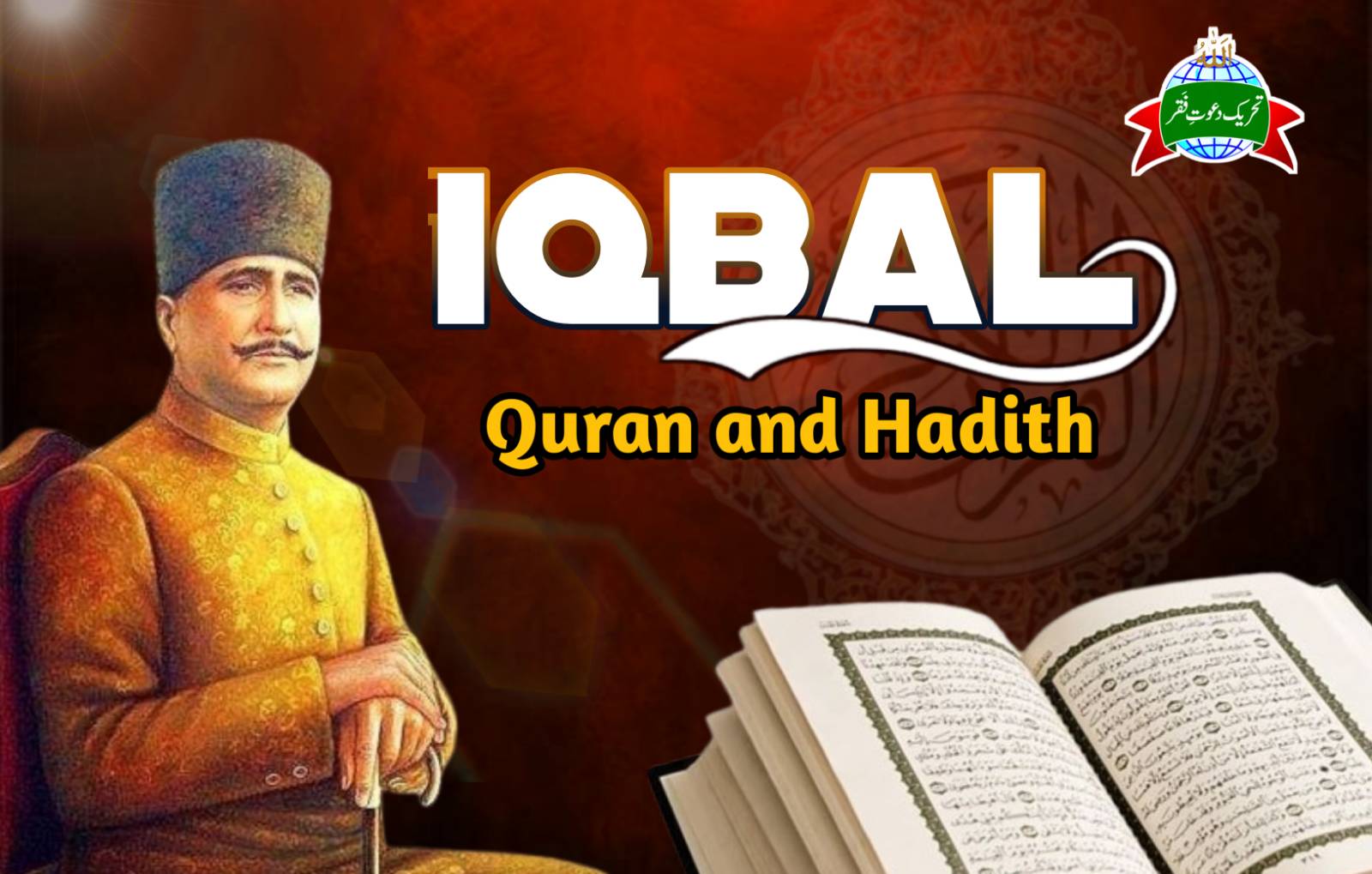
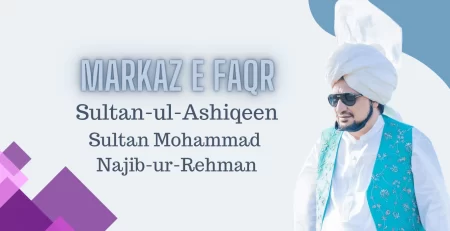
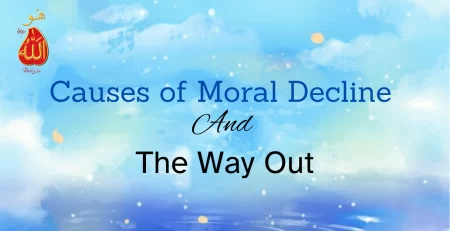

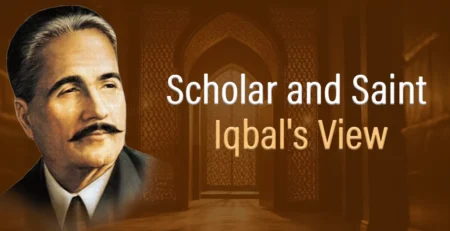
Comments (18)
Very Nice article👍🏻 I will read Faqr e Iqbal to know more about spirituality!
Beautiful article as always. Keep up the good work!
Very Beautiful ❤️ and Informative Article
Really a great article ❤️
Best article
Allama Iqbal’s poetry is a reflection of Quran and Hadith.
The Holy Prophet said “None of you will have faith till he loves me more than his father, his children and all mankind.” (Sahih Bukhari 15)
Beware of that Faqr (compulsive) which only brings you downfall and misery! Whereas the true Faqr gives the power to transform dust into gold by alchemy. (Bal-e-Jibril/Gabriel’s Wing)
Allama Iqbal’s poetry is just an exegesis of the Holy Quran and Hadiths
Allama Iqbal was a Saint and teachings of Saints are indeed teachings of Quran and Hadith
Behtareen
Allama Iqbal’s poetry is just an exegesis of the Holy Quran and Hadiths. Explaining all his teachings in one article is impossible. His teachings are a beacon for the followers of Faqr
Nice article
Behtareen
Very informative article 👍
Very well written 👍
❤️❤️❤️❤️❤️❤️
کی محمد سے وفا تو نے تو ہم تیرے ہیں
یہ جہاں چیز ہے کیا لوح و قلم تیرے ہیں